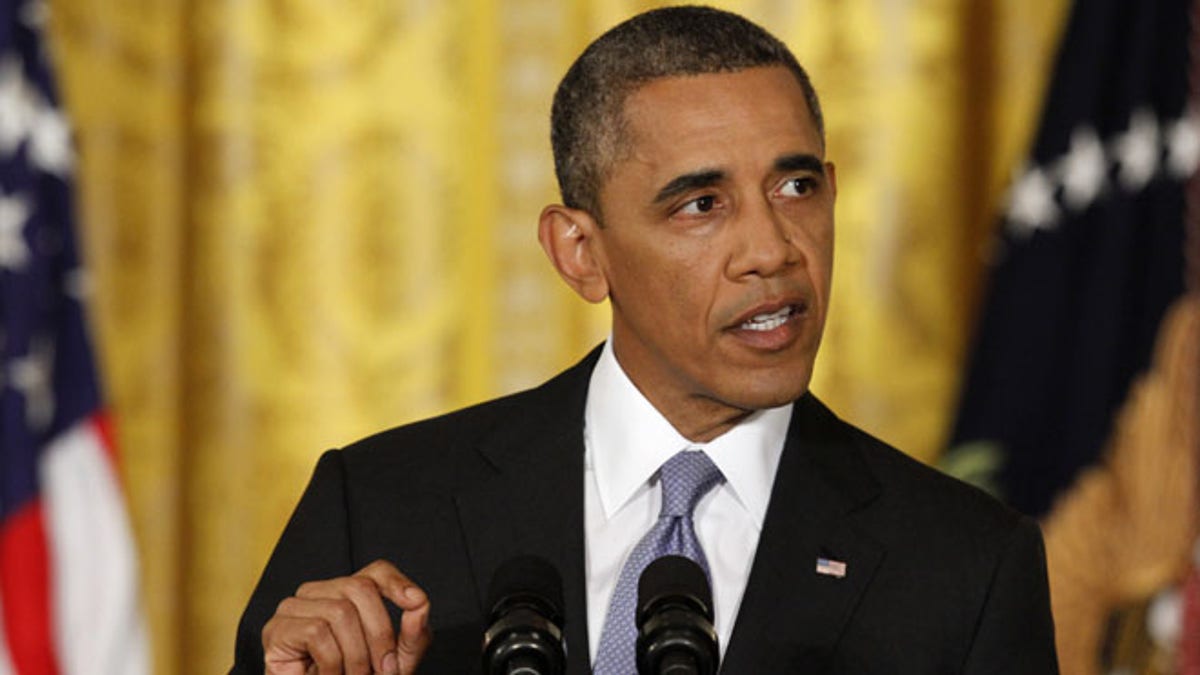
FILE: Aug. 9, 2013: President Obama speaks during a news conference in the East Room of the White House in Washington. (AP)
President Obama vowing that Syria would “cross a red line” by using chemical weapons is far from the only marker he’s laid down or promise he’s tried to keep since running for president in 2008.
The president has made more than 500 campaign-related promises alone. And just last week he re-drew a line in the sand for congressional Republicans flirting with shutting down the government over his Affordable Care Act and looking for spending cuts as part of a separate deal to increase the federal debt limit.
“That’s not happening,” Obama said. “I will not negotiate over the full faith and credit of the United States.”
The president has had mixed success in keeping that vow over the past few years.
He managed in January to get the debt ceiling raised without yielding to Republicans’ demand for accompanying spending cuts.
However, in 2011 he failed to reach a “grand bargain” with House Republicans over the debt ceiling, forcing both sides to eventually accept a series of drastic spending cuts known as sequester.
“The sequester is not something that I've proposed,” Obama announced in his final 2012 presidential debate. “It is something that Congress has proposed.”
PolitiFact -- the Pulitzer Prize-winning project of the Tampa Bay Times that has essentially tracked all of the president’s major promises -- ruled Obama’s argument “mostly false.”
“It was Obama’s negotiating team that came up with the idea,” wrote PolitiFact.
The project finds that Obama has kept 241, or 45 percent, of his roughly 500 campaign promises, while breaking 118, or 22 percent, and compromising on roughly 25 percent. The remaining 8 percent are essentially still to be determined.
Though tracking a president’s promises is among Washington’s favorite parlor games, Obama’s “red line” vow in August 2012 has perhaps become his most debated and closely watched -- as it plays out on an international stage.
Obama waited for months, amid reports that Syrian President Bashar al-Assad was using a chemical weapon in that country’s roughly 2-year-long civil war. However, after reviewing compelling evidence about an Aug. 21 sarin-gas attack that killed nearly 1,500 Syrians, the president said the United States must take military action.
The president appeared to try to blur the red line when he said earlier this month: "I didn’t set a red line. The world set a red line. … My credibility isn't on the line. The international community’s credibility is on the line."
The outcome remains in flux as Congress, at the president’s request, considers whether to authorize the use of limited military force and Syria moves closer to a diplomatic solution in which it would put its chemical weapons under international control.
PolitiFact has picked Obama’s top 25 promises and concluded he has kept nine, broken six and compromised on seven with three still in the works.
Among the most significant kept promises are removing U.S. combat troops from Iraq and ending the use of torture as an interrogation tactic on international prisoners.
Obama’s failure to close the Guantanamo Bay Detention Center and imposing tougher rules on the so-called “revolving door” for lobbyists and former officials are among the top broken promises for PolitiFact and others -- with a little more than three years remaining in his two-term presidency.
PolitiFact argues that Obama’ path to citizenship remains a work in progress.
To be sure, he must wait for the Republican-led House to vote now that the Democrat-controlled Senate has passed the legislation.
The project also concludes Obama’s promise to create 5 million new “green” jobs also is still in the works.
However, PolitiFact reports the federal government didn't count such jobs until this year, which make tracking the promise difficult. And the Brookings Institution, a nonpartisan think tank, estimates the U.S. economy had 2.1 million green jobs in 2003 and 2.7 million of them in 2010, which would make the goal of 5 million hard to reach by 2016.
PolitiFact also concludes the president broke his promise to cut a typical family’s insurance premiums by as much as $2,500 annually under ObamaCare.
However, the project didn’t address the president’s June 2009 promise that “If you like your health care plan, you’ll be able to keep your health care plan, period.”
Unions have argued that ObamaCare could make the cost of insurance for workers under multi employer plans more expensive, forcing them into the so-called government backed “exchanges.”
“The Obama administration and Congress must not allow this to happen,” the International Brotherhood of Electrical Workers said this summer.




